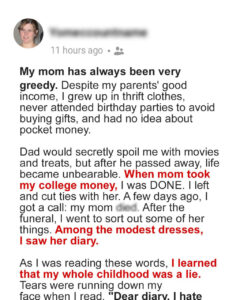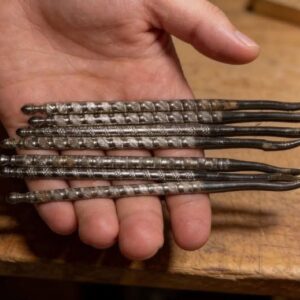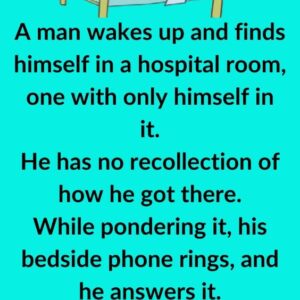
As I could remember, my mother’s insatiable greed and frugality cast a long, dark shadow over my childhood.
It made no sense because we weren’t a poor family — in fact, we were far from that. My parents both earned more than enough to provide a comfortable life. My father, Henry, was a regional manager for a popular retail store. And my mother, Lydia, was a nurse. We were fine.

However, my mother always seemed obsessed with saving money. Her relentless penny-pinching made me resent her deeply. I couldn’t understand why she was so strict, especially when Dad and I wanted to enjoy simple pleasures.
Dad was kind, understanding, and always had time for me. He was my favorite person in the world. His tragic de:ath in a car acci:dent when I was seventeen shattered me. Losing him felt like losing the only person who truly understood me.
After Dad’s passing, my relationship with Mom deteriorated even further. I blamed her for everything — her coldness, her stinginess, and now, for taking Dad away from me.
Our fragile relationship couldn’t handle anything else. But then, everything changed when Mom drained my college fund.
I had worked so hard, maintained good grades and secured a partial scholarship. The rest of the expenses were supposed to come from the fund my parents had diligently saved for years. When I found out it was gone, I was livid.
“How could you?” I screamed at her. “How could you take away my future?”
She didn’t say much, just looked at me with those weary eyes, her face etched with lines of stress and sorrow. “It wasn’t what you think,” she murmured, but I didn’t want to hear her excuses. I stormed out, vowing never to forgive her.
Years were over, and I distanced myself from Mom. I managed to put myself through college, working multiple jobs and scraping by. I built a life for myself, but the resentment toward my mother never faded.
It wasn’t until after mom die:d that I found the truth. Cleaning out her house, I stumbled upon an old, worn-out diary tucked away in a drawer. Curious, I started reading.
Reading the diary, I realized a side of my mother I had never known. The entries began when I was just a baby. She wrote about her dreams, her love for my father, and her hopes for our family. But as I read further, I uncovered the reasons behind her frugality.

Reading the diary, I realized a side of my mother I had never known. The entries began when I was just a baby. She wrote about her dreams, her love for my father, and her hopes for our family. But as I read further, I uncovered the reasons behind her frugality.
That was her struggles with my father’s hidden gambling a:ddic:tion. She had been trying to save every penny to keep us afloat, to pay off debts my father had incurred without my knowledge. She shielded me from the harsh reality of our financial situation, sacrificing her own desires and reputation in my eyes to ensure we had a roof over our heads.
One entry stood out: “Today, I had to drain Cara’s college fund. Henry’s debts have caught up to us. I couldn’t tell her. She would never understand. But it was the only way to keep us from losing the house. I hope she can forgive me someday.”
My heart shattered. All those years of resentment, all those bitter words I had thrown at her — they were based on a lie. She had been protecting me, even if it meant becoming the villain in my eyes.

I sat there for hours, crying, clutching the diary to my chest. I had spent so much time hating her, and now it was too late to apologize, too late to tell her I finally understood.
In that moment, I promised to honor her memory. I would forgive her, as she had always hoped I would, and let go of the bitterness that had poisoned our relationship. I realized how much she loved me, in her own flawed way, and I regretted every harsh word and every moment of anger.
My mother’s diary changed my perspective on my whole life. It taught me the importance of understanding and compassion, and the painful cost of assumptions. It was a lesson I wished I had learned sooner, but one I would carry with me forever.





